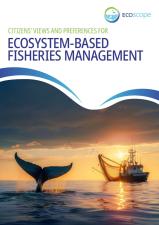
The EU-funded EcoScope project aims to promote effective Ecosystem-Based Fisheries Management (EBFM). One of the objectives of the project was to understand the perceptions, preferences, and values citizens have for EBFM. To this end, the University of Malta led by Marie Briguglio, performed a large-scale survey in which over 1,500 people from UK, Bulgaria and Malta were asked to respond to over 100 questions. The people responding to the survey represented the broader population of each country, and included respondents of diverse education and income levels, from ethnic majorities and minorities, and with a range of marital and employment statuses. This Policy Brief highlights the main findings of this study.
Key findings were that the majority of people eat fish at least once a week, support regulations to improve fisheries management - particularly if they protect marine life - and are willing to pay more for fish labelled as ‘sustainable stock’ or ‘protects marine life’, despite the overwhelming majority having never heard of the term “Ecosystem-Based Fisheries Management”. Citizens also supported the use of taxpayer money for improving fisheries regulation.
The Policy Brief recommends to: 1) Educate the public about EBFM and its benefits; 2) Consider public concerns and priorities when designing fisheries regulations; and 3) Understand and research the social implications of fisheries policies, such as their effects on food security and other marine ecosystem services that impact individuals and communities.
You can find out more about the EcoScope project here and EMB’s involvement here, read the news article of this publication here and see an online summary of the study here.